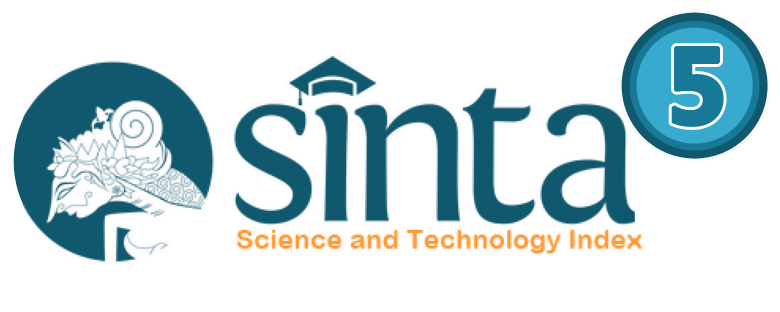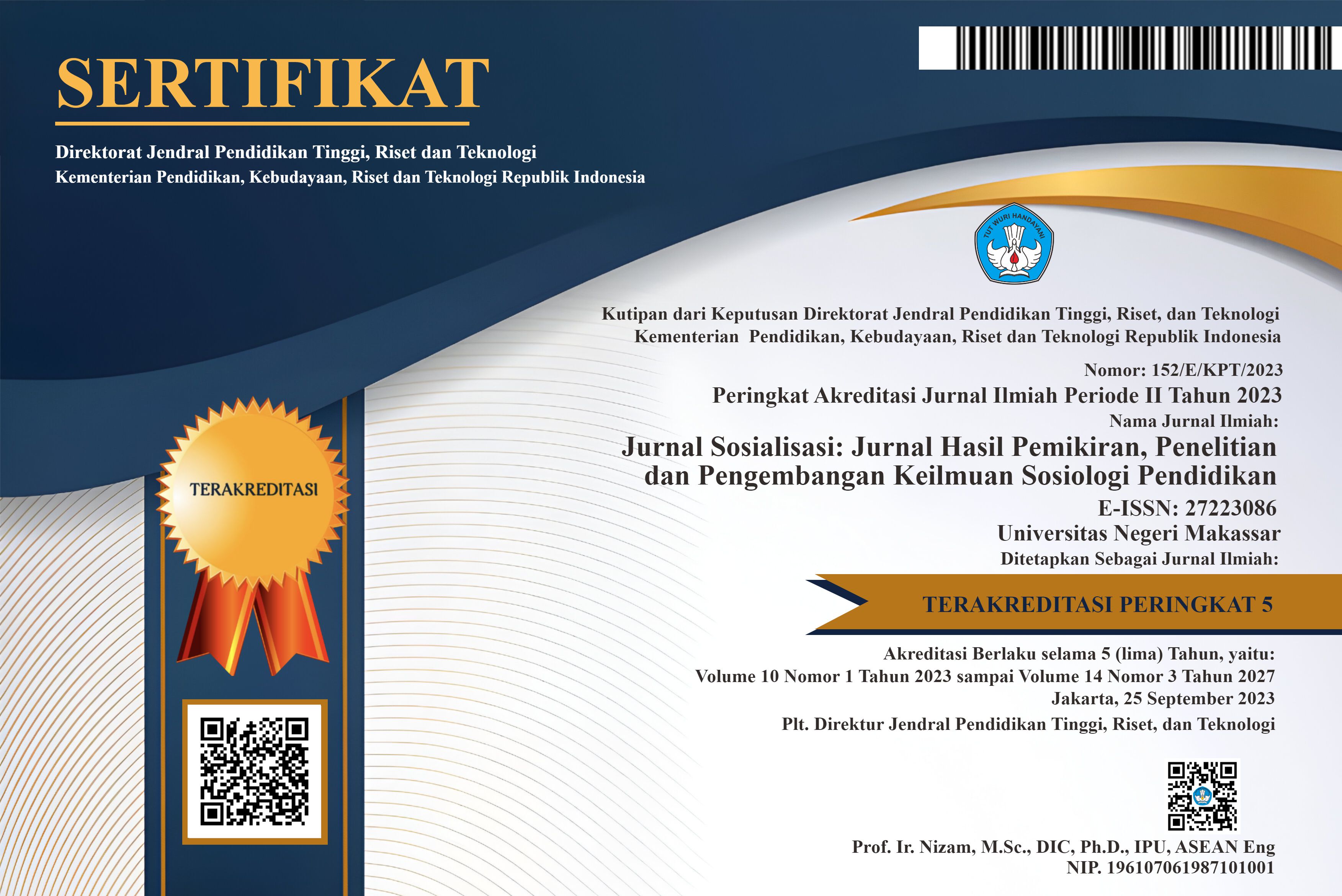Epistemology in Islam: A Philosophical Study
(1) Department of Philosophy, Federal University Wukari, Taraba state.
(*) Corresponding Author
DOI: https://doi.org/10.26858/sosialisasi.v1i1.22566
Abstract
Keywords
Full Text:
PDFReferences
Abu-Sway, M. M. (1993). The genetic development in Al-Ghazzaliyy's epistemology (Doctoral dissertation, Boston College).
Adeel, M. A. (2019). Epistemology of the Quran. Springer International Publishing.
Ahmad, F. A. (2012). Philosophical underpinnings of islamic management method: Worldview, epistemology and ontology. International Journal of Humanities and Social Science, 2(20), 150-161.
Ahmed, I. (1987). The concept of an Islamic state: An analysis of the ideological controversy in Pakistan. Pinter.
Akkach, S. (2019). Ilm: Science, Religion and Art in Islam (p. 240). University of Adelaide Press.
Al Migdadi, M. H. (2012). Issues in Islamization of Knowledge, Man and Education. Revue Académique des Études Sociales et humaines, 7(3).
Al-Faruqi, I. R. (1992). Al Tawhid: Its implications on thought and life (No. 4). IIIT.
Ali, A. Y. (1975). The Glorious Quran: translation and commentary. eduright4all.
Allāh, M. Ḥ. F. (2003). Islam, the Religion of Dialogue. Almalak Ed.
Andrew, E. H. (2014). The Restrictions of the Modern Proscenium Stage on Traditional African Values. Cajolis: Calabar Journal of Liberal Studies, 7(2), 114-127.
Ashraf, S. A., & Husain, S. S. (1979). Crisis in Muslim education. Sevenoaks: Hodder and Stoughton.
Aziz, M. W. (2017). Wakaf Tunai dalam Perspektif Hukum Islam. International Journal Ihya''Ulum al-Din, 19(1), 1-24.
Bensaid, B., Machouche, S. B. T., & Grine, F. (2014). A Qur’anic framework for spiritual intelligence. Religions, 5(1), 179-198.
Black, D. L. (2006). Knowledge (‘ilm) and certitude (yaqīn) in al-fārābī’s epistemology. Arabic Sciences and Philosophy, 16(1), 11-45.
Elkheir, G. O. A. (2001). The Need to Teach Thinking from an Islamic
Perspective. Tafakkur, 3(2).
Everson, S. (Ed.). (1990). Epistemology (Vol. 1). Cambridge University Press.
Fachruddin, F. (2005). Educating for democracy: Ideas and practices of Islamic civil society associations in Indonesia (Doctoral dissertation, University of Pittsburgh).
Hamati‐Ataya, I. (2014). Epistemology. The Encyclopedia of Political Thought, 1116-1126.
Hamm, R. L. (1981). Philosophy and Education. Alternatives in Theory and Practice. The Interstate Printers & Publishers, Inc., Danville, IL 61832.
Harisah, A., Irawan, A. M., & Iskandar , I. (2019). Islamic Epistemology in the Socialization of Islamic Sharia and the Implementation of Democracy in Indonesia . GNOSI: An Interdisciplinary Journal of Human Theory and Praxis, 2(2), 64-77.
Islam, M. S. (2016). Importance of Girls' Education as Right: A Legal Study from Islamic Approach. Beijing L. Rev., 7, 1.
Kazmi, L. H. (2009). Studies in Islamic Philosophy Part Two Modern Islamic Thought. Aligarh: Fatimah Computers and Designers.
Laffan, M. (2010). Understanding Al-Imam’s Critique of Tariqa Sufism. In Varieties of Religious Authority (pp. 17-53). ISEAS Publishing.
Liatsi, M. (2016). Aristotle’s Silence about the Prime Mover’s Noēsis. In Aristotle’s" Metaphysics" Lambda–New Essays (pp. 229-246). De Gruyter.
Löhr, G. (2019). Embodied cognition and abstract concepts: Do concept empiricists leave anything out?. Philosophical Psychology, 32(2), 161-185.
Mamat, A., Ali, M. S., Omar, S. H. S., Abidin, Z. Z., Ahmad, A. B., & Yabi, S. (2019). Literature Review on Concept of Tafakkur in Islamic Mysticism. International Journal of Academic Research Business and Social Sciences, 9(4), 44-53.
Muzaffar, C. (2014). Rights, Religion and Reform: Enhancing human dignity through spiritual and moral transformation. Routledge.
Nwoye, L. (2018). A Critique of Hume’s Ethical Empiricism: Towards Addressing Ethical Dilemmas in Making Moral Choices. GNOSI: An Interdisciplinary Journal of Human Theory and Praxis, 1(2), 9-14.
Ogaba, I. S. (2019). Foundationalism, Coherentism and Naturalism: An Epistemological Survey. GNOSI: An Interdisciplinary Journal of Human Theory and Praxis, 2(2), 98-112.
Özdemir, İ. (2016). Critical Thinking in Turkish Higher Education Leadership: A Case for Al-Ghazali, Ibn Rushd and Nursi. In International Congress of Asian Philosophical Association (ICAPA) 20th-24th July (pp. 299-315).
Rafiabadi, H. N. (2007). Challenges to Religion and Islam, Sarup and Sons, New-Delhi.
Risha, S. (2013). Education and curricular perspectives in the Quran. Unpublished Dissertation. Arizona State University, Tempe, AZ.
Safi, L. (2014). The Foundation of knowledge: A comparative study in Islamic and Western methods of inquiry. International Institute of Islamic Thought (IIIT).
Safi, L. M. (1997). Towards an Islamic theory of knowledge. Islamic studies, 36(1), 39-56.
Sasa, M. S. (2019). An Appraisal of the Concept of Beauty in
Immanuel Kant’s Philosophy. GNOSI: An Interdisciplinary Journal of Human Theory and Praxis, 2(2), 87-97.
Scherer, G. H. (Ed.). (1933). Al-Ghazali's Ayyuha'l-Walad: A Dissertation... American Press.
Shariati, A., & Marjani, F. (1981). Man and Islam. North Haledon: Islamic Publications International.
Thompson, L. L. (1990). The book of Revelation: Apocalypse and empire. Oxford University Press on Demand.
Vandestra, M. (2017). Story of Prophet Adam In Islam. Distributed via Smashwords.
Yunus, S. (2000). The doctrine of certainty in the Islamic methods of inference/Yunus Soualhi (Doctoral dissertation, University of Malaya).
Yusuf, A., & Ali, A. Y. (2003). The Holy Qurʼān: Text, Translation, and Commentary. Goodword Books.
Zysow, A. (2014). The economy of certainty: An introduction to the typology of Islamic legal theory (Vol. 2). ISD LLC.
Article Metrics
Abstract view : 1025 times | PDF view : 160 timesRefbacks
- There are currently no refbacks.

This work is licensed under a Creative Commons Attribution 4.0 International License.


































